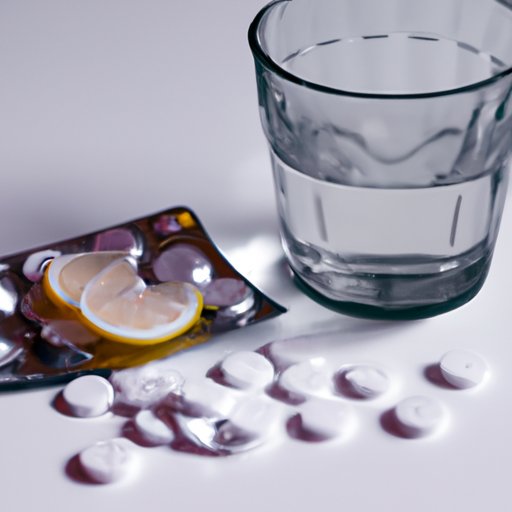
Introduction
A fever, otherwise known as pyrexia, occurs when the body’s temperature rises above its regular level. It is a common symptom of various underlying conditions, such as the flu, pneumonia, and infections. Promptly addressing a fever is essential as it can result in additional complications. This article explores seven approaches to tackle fevers, including home remedies, medication, hydration, rest, diet, seeking medical help, and prevention.
Home Remedies
Home remedies are effective for treating mild fevers and are easy to access. You can try these five remedies:
- Drinking fluids: The body loses fluids and electrolytes during a fever, so it’s essential to hydrate with water and electrolyte-rich drinks like sports drinks and broths. Avoid caffeine and alcohol as they can cause dehydration.
- Applying a cool compress: Placing a wet towel or cloth on the forehead, wrists, or neck can help reduce the fever and relieve discomfort. Avoid using ice packs as it can cause shivering and increase the core body temperature.
- Taking a lukewarm bath: Soaking in a lukewarm bath can help reduce the fever and relieve muscle pain and discomfort. Avoid hot water as it can cause the temperature to rise.
- Using essential oils: Peppermint oil and eucalyptus oil have cooling properties and can aid in fever relief. Mix a few drops with a carrier oil and apply to the forehead, neck, and temples.
- Resting and avoiding physical exertion: Physical activity can increase the body’s temperature. It’s important to rest and save energy for immune functions.
These remedies work best for mild fevers and avoiding overheating. Be cautious not to overstate the measures, and avoid giving infants and young children any medication without consulting their pediatrician to avoid potential adverse effects.
Medications
Over-the-counter medications can help reduce a fever, but it’s essential to follow the right dosage. Two of the common medications for fever include:
- Acetaminophen: Also known as paracetamol, it’s frequently prescribed for patients with a fever or discomfort since it is safe for children and adults. The medication helps decrease fever and alleviate pain. It is essential to follow the instructions and avoid overdosing. Overdosing can cause liver damage and other health complications.
- Ibuprofen: An anti-inflammatory medication that can also reduce fever and relieve mild pain or discomfort. It is commonly prescribed to people with arthritis, menstrual cramps, and other conditions. As with Acetaminophen, it is essential to follow the dosage instructions and avoid overdosing. Ibuprofen can cause heart diseases and gastrointestinal problems when used inappropriately.
It is essential to read the instructions and consult with a physician before taking any medication. Avoid giving acetaminophen or ibuprofen to children below six months old.
Hydration
Hydration is the key to reducing fever symptoms and avoiding complications. Water is an essential option for staying hydrated. Sports drinks or broths can also be beneficial in restoring vital nutrients, such as electrolytes, lost during a fever. Herbal teas can assist in relieving coughs, sore throats, and other symptoms accompanying the fever.
Sometimes patients may have difficulty drinking fluids or suffer from vomiting. In such cases, popsicles, watery fruits, or vegetable soups can also be beneficial.
Rest
Rest is essential in combating fevers. It helps the body recuperate and strengthens the immune system. It is imperative to avoid over-exertion, limit physical activity, and stay cool. Getting adequate sleep is also essential in allowing the body to heal.
Avoid overheating by keeping the environment cool and calm. Take lukewarm baths, place cool towels on the body, and keep the bedroom temperature cool.
Diet
Your diet plays a significant role in improving your body’s health during a fever. Consuming light soups and broths can help alleviate fever symptoms. These options hydrate the body and provide essential nutrients, such as protein and vitamins.
Similarly, herbal tea, particularly with honey, ginger, or lemon, can aid in reducing fever symptoms and improving overall health. Avoid alcoholic or caffeinated beverages, since they may cause dehydration.
When to seek medical help
In severe cases, a fever can be dangerous and can quickly escalate to life-threatening conditions. Consult with a physician if you experience the following:
- A high temperature (above 102 degrees Fahrenheit)
- Persistent fever for several days (three days or longer)
- Difficulty breathing or chest pain
- Severe headache, stomach pain, or joint pain
In these instances, prompt medical attention is crucial. Continuing to rely only on home remedies may lead to further complications.
Prevention
Preventing a fever is always better than curing one. Here are some precautions you can take:
- Washing hands frequently: Washing your hands before and after meals and after using the toilet can help prevent infection and reduce the risk of fevers.
- Avoiding contact with sick individuals: If someone around you is sick, their pathogens could get you sick as well.
- Vaccinations: Vaccines help boost your immune system and protect you against common infections that can cause fevers, such as pneumococcal and flu vaccines.
- Maintaining a healthy lifestyle: A healthy lifestyle, regular exercise, a balanced diet, and adequate sleep can improve your immune system and reduce the risk of infection.
Conclusion
A fever can be unsettling and uncomfortable, but it is treatable and preventable. Simple home remedies can relieve mild symptoms. Medications, hydration, rest, and proper nutrition are fundamental in controlling and preventing fevers. Seeking medical attention is essential in severe cases. Adopting a healthy lifestyle and maintaining hygiene practices can reduce the chances of getting a fever. Remember; treating fevers promptly is essential in preventing further complications.





